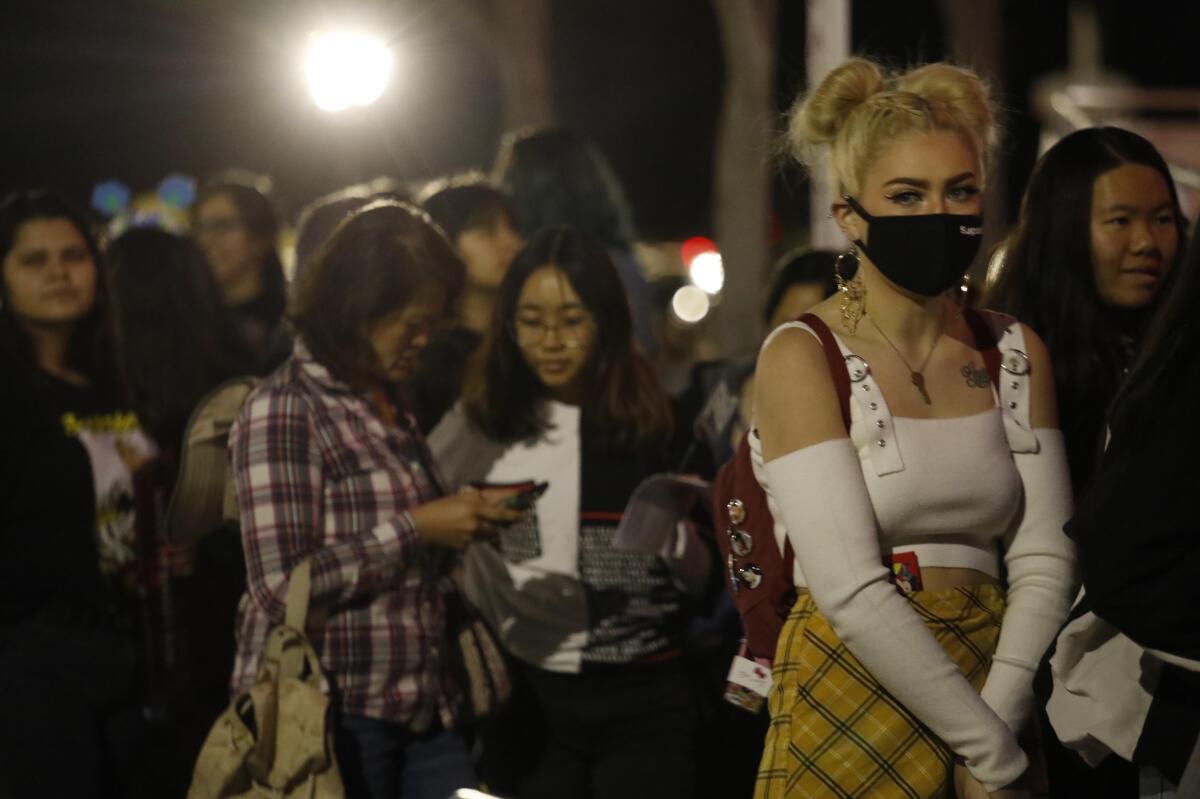From movies to concerts: Five ways the coronavirus is affecting Hollywood and entertainment

- Share via
Fears about a coronavirus pandemic have prompted comparisons to the 2011 Steven Soderbergh thriller “Contagion.” Even Goop founder Gwyneth Paltrow, who starred in the movie, noted the parallel on social media this week, posting an Instagram photo of herself wearing a face mask, writing, “I’ve already been in this movie.”
In real life, the situation has caused serious problems for the global entertainment industry, especially in China, which is a critical place of business for Hollywood studios.
Theaters in China, the world’s second largest box office market behind the U.S. and Canada, have almost entirely shut down. So have theme parks and film shoots. Travel bans meant to curb the global spread of the virus have affected business conferences and live events, such as concerts.
More broadly, concerns about the potential effect of coronavirus on business drove stocks down this week. Declines for the S&P 500, Dow Jones Industrial Average and Nasdaq continued Thursday after the Centers for Disease Control and Prevention confirmed the first case of coronavirus in the U.S. involving a patient who neither recently traveled out of the country nor was in contact with someone who did.
Measuring the long-term impact on the entertainment industry is impossible because it’s not clear when the spread of the disease will be contained, said Stanley Rosen, a USC political science professor and China film expert. “It’s an incredibly big deal, and we’ll have to see how long it takes to get back to what the Chinese call the new normal,” he said.
Here’s where the entertainment business is feeling the effects.
Box office
The closure of almost all movie theaters in mainland China — accounting for 70,000 screens — is a huge deal for the movie business.
Last year, China’s box office hit a record $9.2 billion, more than 20% of worldwide revenues. During the 2019 Spring Festival holiday alone, box-office sales totaled about $1.5 billion. This year, the key holiday period (which ran Jan. 24 through Feb. 12), generated just $3.94 million in sales, according to Artisan Gateway, a consultancy that follows the Chinese film industry.
Several release dates for studio films, including Universal Pictures’ “Dolittle” and “1917,” Searchlight Pictures’ “Jojo Rabbit” and Paramount Pictures’ “Sonic the Hedgehog,” have been postponed indefinitely. Depending on the length of the closures, movies including Pixar’s “Onward” and Sony Pictures’ “Bloodshot” could also be vulnerable.
For Walt Disney Studios, it remains to be seen when the company will be able to release its high-stakes remake of “Mulan” in China. The big-budget film, featuring Wuhan-born star Liu Yifei in the title role, is set to open in the U.S. on March 27, but had not confirmed a Chinese release date. The movie filmed in New Zealand and China.
The major studios, which have offices and employees in the affected areas, are in a holding pattern as they wait to see how the virus alters release schedules. China’s government strictly controls the timing of releases there. Some delayed movies could struggle if they’re released in bulk after the epidemic subsides, creating additional uncertainty. “There’s no playbook for this,” one studio insider said.
What’s more, once theaters reopen in China, there’s no guarantee that patrons will flock back to the multiplex. Lingering fears of infection could keep people home, Rosen said. Beyond China, there are signs that the box office is taking a hit in other countries with coronavirus outbreaks, due to people wanting to stay out of shared public spaces to avoid infections, according to studio executives who were not authorized to speak publicly.
Productions
China’s government put an indefinite halt on all film production in the country as the death toll escalated.
The pause in filmmaking is expected to have a significant effect on the movie business because the bulk of China’s box office is now generated by films produced there. In 2019, eight of the top 10 movies in Chinese were local productions, including animated feature “Ne Zha” and sci-fi adventure “The Wandering Earth.”
The government order, reported by local media, came after some major studios shut down operations. Those included Qingdao Oriental Movie Metropolis, a massive complex developed by Dalian Wanda Group, as well as Hengdian World Studios, based in the province of Zhejiang. Local production has been a priority for the government, especially patriotic films and co-productions that can stoke national pride and extend China’s cultural influence abroad.
“It seems to be to me that China’s going to prioritize its own films when things come back online,” Rosen said.
At least one Hollywood production has suffered. Paramount Pictures this week delayed its plans to film the seventh “Mission: Impossible” film in Italy, the location of one of the biggest outbreaks outside Asia. The Tom Cruise action film is expected to be released in July 2021.
Theme parks
Walt Disney Co. closed its themed resorts in Shanghai and Hong Kong while China deals with the epidemic, a move that is likely to hurt the company’s bottom line.
In a recent earnings call, the Burbank entertainment giant said the closures would result in a roughly $175 million hit to operating income in its second fiscal quarter, assuming they shut down for two months.
The crisis represents an immediate challenge for new Disney CEO Bob Chapek, who was promoted Tuesday in a surprise announcement. He replaced Bob Iger, who is now executive chairman guiding creative endeavors after 15 years in the top job. Chapek was most recently head of Disney’s parks, experiences and products segment, overseeing expansions such as the 2016 launch of Shanghai Disney Resort.
In response to a question from CNBC’s Julia Boorstin about the expected long-term challenges, Chapek said the company’s brands will “outlast” the virus.
“While this is certainly a bump in the road in terms of the coronavirus, we’ll come through this like we’ve come through every other challenge that we’ve had, and that affinity for the brand and our storytelling will way outlast any short-term blip that we have from Corona,” Chapek said.
Cinema’s Vegas confab
It seems a given that events that rely significantly on overseas travel will feel the pain from the coronavirus’ spread.
CinemaCon, the annual Las Vegas gathering of studios and theater owners, said Wednesday that a number of Chinese companies had pulled out of the confab due to travel restrictions. Eight Chinese companies, all vendors that would’ve participated in the event’s trade floor, have said they will not attend, amounting to about 24 participants dropping out.
Nonetheless, CinemaCon’s organizers said the show will continue as planned at Caesars Palace, March 30 through April 2. CinemaCon director Mitch Neuhauser and National Assn. of Theatre Owners head John Fithian addressed the situation in a memo to attendees, saying they were in close contact with the CDC and Las Vegas health and safety officials.
“NATO and CinemaCon believe that our plans going forward should be based on logical risk assessments and advice from health officials, and not from fear,” the organizers said. “At the same time, we want to be sensitive to the legitimate concerns of those people and companies that have been affected by the virus, most notably in Asia and a few other affected territories.”
CinemaCon begins with an “international day,” reflecting the importance of foreign exhibition for the film industry.
Gaming and live music
While CinemaCon appears to be forging ahead, major companies in the gaming industry — an increasingly important part of the entertainment landscape — have canceled conference plans.

Even before San Francisco declared a preventive local emergency amid coronavirus fears, the annual Game Developers Conference lost a number of major players. Sony Interactive Entertainment, Facebook Gaming and Facebook’s virtual reality arm Oculus were among those who initially balked at attending GDC, an annual event that’s one of the world’s largest professional gatherings of interactive industry talent. Those were swiftly followed by Microsoft, Electronic Arts, Amazon Web Services and others.
Microsoft in a blog post stated that “after a close review of guidance by global health authorities and out of an abundance of caution, we’ve made the difficult decision to withdraw from participating at Game Developers Conference 2020 in San Francisco. The health and safety of players, developers, employees, and our partners around the world is our top priority.”
Software development firm Unity made a similar statement and also pledged to share a number of its intended GDC sessions online.
GDC is an especially noteworthy conference as it melds new tech with experimental games in addition to holding numerous talks and roundtables on important cultural issues affecting the industry. March’s event was hotly anticipated as the game industry is in a major transitional year, with new consoles from Sony and Microsoft in development and emerging technologies such as virtual and augmented reality continuing to gain traction.
The increasingly global live music industry has also been affected, with multiple concerts canceled in Asia and other places, including Los Angeles. Organizers of the 18th Korea Times Music Festival at the Hollywood Bowl on Tuesday said the event was postponed, citing travel restrictions in Asia.
The festival, sponsored by the Korea Times news organization, promised the best in contemporary Korean music, with artists including Momoland, No Brain, Jo Jung-min, Ha Sung-woon and Kim Yeong-chul already announced. A rescheduled concert date was not given, but tickets will remain valid, the organizers said.
Staff writer Todd Martens contributed to this story.
More to Read
Inside the business of entertainment
The Wide Shot brings you news, analysis and insights on everything from streaming wars to production — and what it all means for the future.
You may occasionally receive promotional content from the Los Angeles Times.











